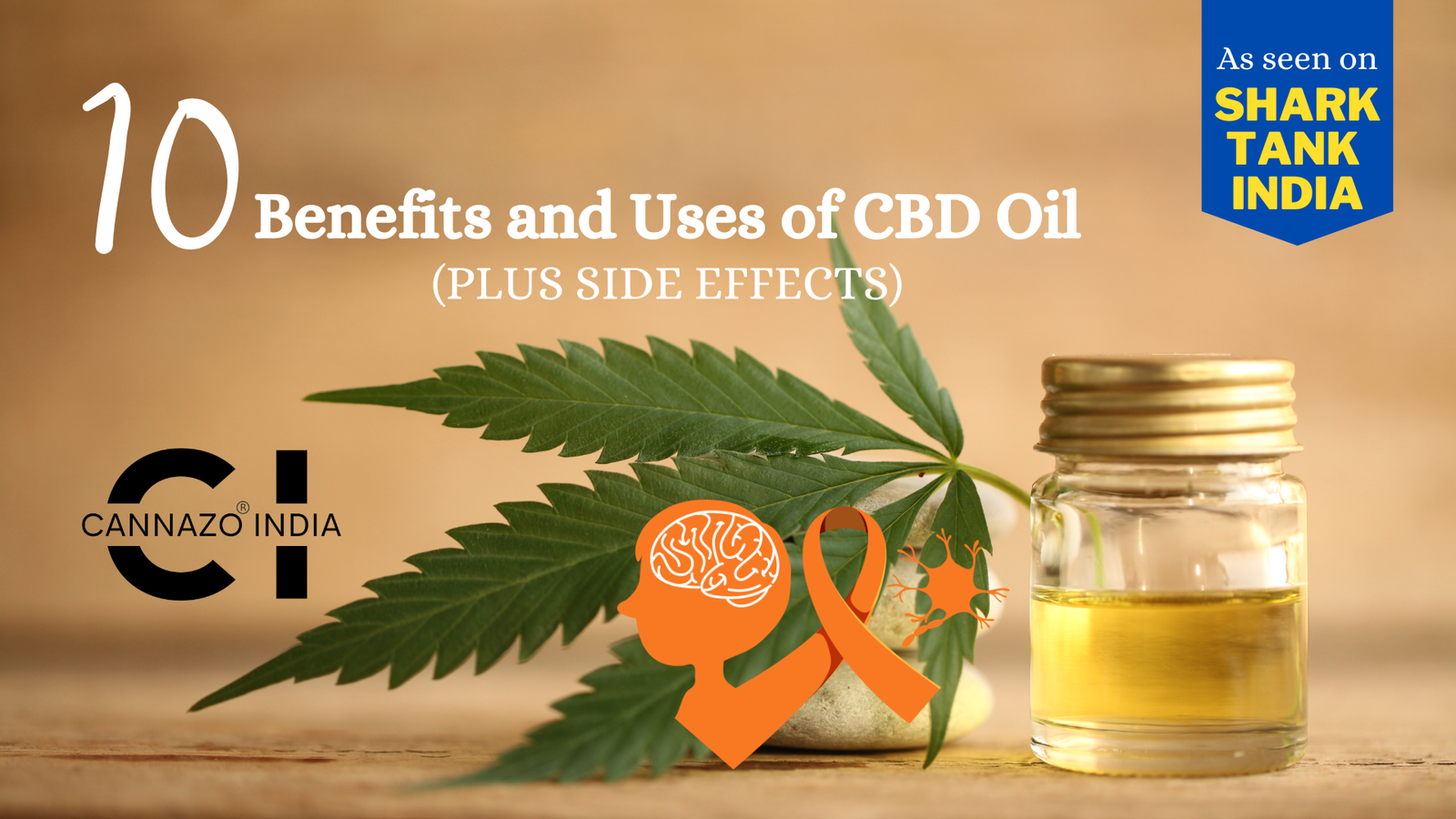Benefits of CBD Oil
Owing to its numerous qualities, there are many Full spectrum CBD oil benefits ranging from pain relief to neuroprotective properties, improved sleep, etc.
Pain Relief
In a 12-month observational study, it was found that medical cannabis (MC) decreases headaches, anxiety, fatigue, and nausea in patients with chronic pain. Moreover, a preliminary study testing the effects of MC extract observed that it improved muscle spasms and spasticity in patients with multiple sclerosis (MS) and spinal cord injury.
A recent study conducted by Cannazo India researchers, proved the efficacy of MC leaf extract for pain syndromes. Post one month treatment with MC, the pain scores and c-reactive protein (CRP) levels (inflammation marker) reduced drastically.
Cancer-Related Symptoms
Numerous case reports have shown that using CBD oil benefits cancer patients by decreasing tumour size. In one case report where the patient had a rare brain tumour, treatment with CBD oil for 11 months decreased the tumour size by around 60%. MC can also help reduce chemotherapy induced nausea and vomiting (CINV) and pain. Full spectrum CBD oil (MC) can improve the appetite and overall quality of life in the patients.
Neuroprotective Properties
CBD oil benefits are not limited to cancer and pain management. CBD oil interacts with the cannabinoid (CB) receptors, CB1 and CB2, in the nervous system along with 5HT1A receptors to improve mood and decrease anxiety and stress.
Moreover, Full spectrum CBD oil also plays a role in the treatment of neurodevelopmental disorders like autism spectrum disorder (ASD). CBD regulates the transmission of GABA and glutamate which play a role in ASD.
Diabetes Prevention
CBD oil also improved joint pain, as self-reported by a type 2 diabetes patient in a case report. Moreover, once the patient self-discontinued insulin and started CBD administration, his pre-prandial blood glucose levels remained stable along with his weight.
Improved Sleep
CBD oil benefits the quality of sleep as well. In a randomised clinical trial with insomnia patients, treatment with CBD over 2 weeks improved their midnight melatonin levels by 30% and sleep duration by 80%.
Uses of CBD Oil
To obtain Full spectrum CBD oil benefits, it is important to understand the forms of consumption available and the correct dosage
Forms of Consumption
CBD oil is available in various formulations including:
- Full-spectrum: contains all compounds from MC including CBD, THC, terpenes, etc.
- Broad-spectrum: contains all compounds except THC.
- Isolate: contains only CBD.
Not only these but CBD oil is also available in different forms:
- Capsules: CBD oil capsules can be ingested orally.
- Inhalers: CBD oil can be heated to inhale as well.
- Vaping: CBD oil can be vaporised and inhaled for a quick effect.
- Topical: It can be directly applied to the skin.
- Sublingual: It can be placed under the tongue for 45-50 seconds as well.
Cannazo India offers products like Vijaya Amrit CBD oil which can be administered topically or sublingually.
Dosage Guidelines
For maximum efficacy and minimum side effects, taking the correct dosage is crucial. Start with a low dose, then observe the Full spectrum CBD oil benefits or any side effects, and finally increase the dosage gradually carefully.
It is recommended to consult with a healthcare professional first. Book a consult with our experts at https://cannazoindia.com/doctor-consultation/.
Integrating CBD into Daily Routine
It is very easy to get CBD oil benefits by seamlessly integrating it into your daily routine. In the morning, you can add a few drops of CBD oil to your morning smoothie or coffee to kickstart your day. In the afternoon, capsules or tinctures can be directly administered to alleviate any mid-day stress and fatigue.
In the evening, enrich your herbal teas with CBD oil to relax and de-stress. As for bedtime, gently massage CBD oil to improve sleep quality and relax the mind.
Side Effects of CBD Oil
Although CBD oil benefits have been proven by numerous case reports and clinical trials, a few mild side effects have also been observed in some patients.
Common Side Effects
- CBD oil is usually well-tolerated by most people. Some but mild side effects reported include:
- Dry mouth
- Fatigue
- Appetite and weight changes
- Diarrhoea
- Nausea
It is important to note that these side effects only appear for a short time and usually disappear within a few days of appearance.
Drug Interactions
CBD oil interactions with certain drugs usually help to improve the outcome of treatment. CBD oil benefits treatment with antimetabolites by decreasing markers of resistance and reducing inflammation in the oral mucosa. It can also interact with alkylating agents t decrease colony formation of cancer cell lines.
However, it is important to be prudent in the use of CBD oil. Drug-drug interactions with CBD oil can decrease the effectiveness of some anticancer drugs.
Safety Concerns
CBD oil is a safe and efficacious plant-based alternative for the management of numerous chronic conditions like asthma, arthritis and diabetes.
Although CBD is extracted from MC, it is non-intoxicating and non-addictive, and can thus be used without any worry under the consultation of a healthcare professional.
Conclusion
There are numerous CBD oil benefits ranging from anti-inflammation, decreased pain, reduced stress and anxiety, better sleep quality and overall improved quality of life, making CBD oil a good option for the treatment of chronic conditions.
Ensure to start using CBD oil with a low dose and only increase the dosage if no side effects are observed.
References
- Buchtova, T., Lukac, D., Skrott, Z., Chroma, K., Bartek, J., & Mistrik, M. (2023). Drug–Drug Interactions of Cannabidiol with Standard-of-Care Chemotherapeutics. International Journal of Molecular Sciences, 24(3), 2885.
- García-Gutiérrez, M. S., Navarrete, F., Gasparyan, A., Austrich-Olivares, A., Sala, F., & Manzanares, J. (2020). Cannabidiol: a potential new alternative for the treatment of anxiety, depression, and psychotic disorders. Biomolecules, 10(11), 1575.
- Kenyon, J., Liu, W. A. I., & Dalgleish, A. (2018). Report of objective clinical responses of cancer patients to pharmaceutical-grade synthetic cannabidiol. Anticancer Research, 38(10), 5831-5835.
- Mattes, R. G., Espinosa, M. L., Oh, S. S., Anatrella, E. M., & Urteaga, E. M. (2021). Cannabidiol (CBD) use in type 2 diabetes: a case report. Diabetes Spectrum, 34(2), 198-201.
- Parrella, N. F., Hill, A. T., Enticott, P. G., Barhoun, P., Bower, I. S., & Ford, T. C. (2023). A systematic review of cannabidiol trials in neurodevelopmental disorders. Pharmacology Biochemistry and Behavior, 173607.
- Ried, K., Tamanna, T., Matthews, S., & Sali, A. (2023). Medicinal cannabis improves sleep in adults with insomnia: a randomised double‐blind placebo‐controlled crossover study. Journal of sleep research, 32(3), e13793.
- Safakish, R., Ko, G., Salimpour, V., Hendin, B., Sohanpal, I., Loheswaran, G., & Yoon, S. Y. R. (2020). Medical cannabis for the management of pain and quality of life in chronic pain patients: a prospective observational study. Pain Medicine, 21(11), 3073-3086.
- Wade, D. T., Robson, P., House, H., Makela, P., & Aram, J. (2003). A preliminary controlled study to determine whether whole-plant cannabis extracts can improve intractable neurogenic symptoms. Clinical rehabilitation, 17(1), 21-29.





